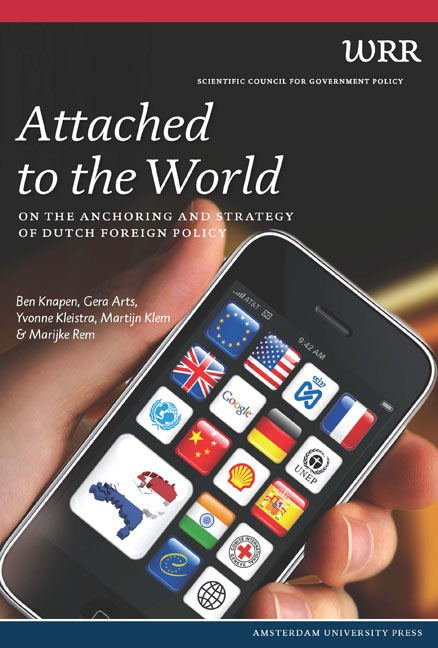Book contents
- Frontmatter
- Contents
- Summary
- Preface
- 1 Motivation and Background: An Introduction
- 2 From Fragmentation to Strategy
- 3 Europe: Arena and Link
- 4 Directing and Facilitating
- 5 Conclusions and Recommendations
- List of Abbreviations
- References
- List of Interviewees
- Appendix 1 The Interrelatedness of the Dutch EconomY
- Appendix 2 The Interrelatedness of the Netherlands With other Nations
- Appendix 3 The Dutch Network of Embassies in a Comparative Perspective
- Appendix 4 Sovereignty in Eu Member States: A Comparison
1 - Motivation and Background: An Introduction
Published online by Cambridge University Press: 19 January 2021
- Frontmatter
- Contents
- Summary
- Preface
- 1 Motivation and Background: An Introduction
- 2 From Fragmentation to Strategy
- 3 Europe: Arena and Link
- 4 Directing and Facilitating
- 5 Conclusions and Recommendations
- List of Abbreviations
- References
- List of Interviewees
- Appendix 1 The Interrelatedness of the Dutch EconomY
- Appendix 2 The Interrelatedness of the Netherlands With other Nations
- Appendix 3 The Dutch Network of Embassies in a Comparative Perspective
- Appendix 4 Sovereignty in Eu Member States: A Comparison
Summary
MOTIVATION
Breathtaking and promising: this is what the newly appointed Dutch Cabinet called the developments in the world and the opportunities for the Netherlands three weeks after the fall of the Berlin Wall (Second Chamber 1989-1990, 14th assembly). The Soviet Union had pulled out of Afghanistan, the Berlin Wall had fallen, and the totalitarian Eastern Bloc had vanished. There was a peace dividend to be harvested, and a new, better world was in the offing.
Moments of euphoria prove to be hazardous benchmarks, as the difference with the situation two decades afterward could hardly be greater. Whether it is globalisation, Europe, China's industrial muscle, Islamic fundamentalism, or Wall Street: it seems the outside world is currently presenting itself to the Netherlands chiefly as a potential disturber of order and prosperity. Part of the public has disengaged. In the 2010 election campaign, it was clear for everyone to see how much people's interest in the world outside the Netherlands had shrunk. Though a Cabinet had resigned over a foreign politics issue – troops in Uruzgan – this was a non-election item. Many voters were interested in issues closer to home. Perhaps this was not so much because they were not interested in foreign affairs, but because they, as former State Secretary for European Affairs Frans Timmermans put it, consciously or unconsciously mainly perceive the outside world as a threat: a threat to prosperity, to stability, and to security (Timmermans 2010).
Besides uncertainty about the outside world, various countries show a growing discrepancy in appreciation of what Thomas Friedman popularised under the heading The World is Flat (Friedman 2005). Differences of opinion on processes of globalisation and Europeanisation have increased over the past few years. Those with higher educational attainment levels, who have mastered foreign languages and travel all over the world, are seizing new and exciting development opportunities thanks to globalisation. They are the modern cosmopolitans. At the other end, there are what the sociologist Ulrich Beck called the Globalisierungsverlierer (Beck 1997): large groups of people who, rightly or wrongly, consider themselves the ones who are picking up the bill for globalisation in terms of fewer opportunities and greater risks. Bovens and Wille quite plainly call this an opposition between cosmopolitans and nationalists (Bovens and Wille 2009).
- Type
- Chapter
- Information
- Attached to the WorldOn the Anchoring and Strategy of Dutch Foreign Policy, pp. 15 - 24Publisher: Amsterdam University PressPrint publication year: 2012



